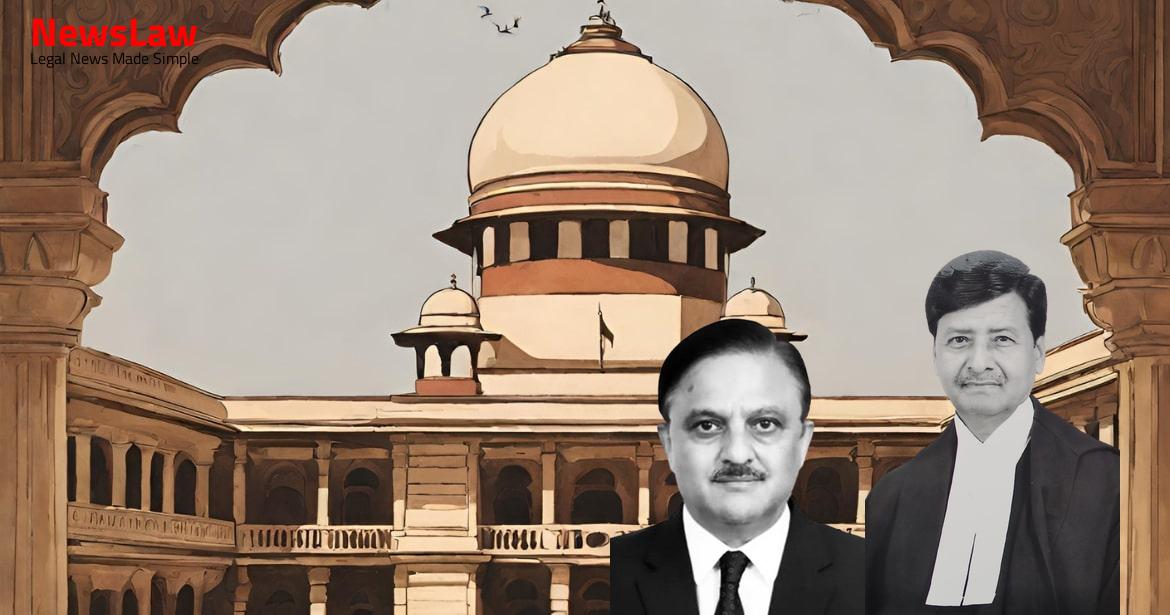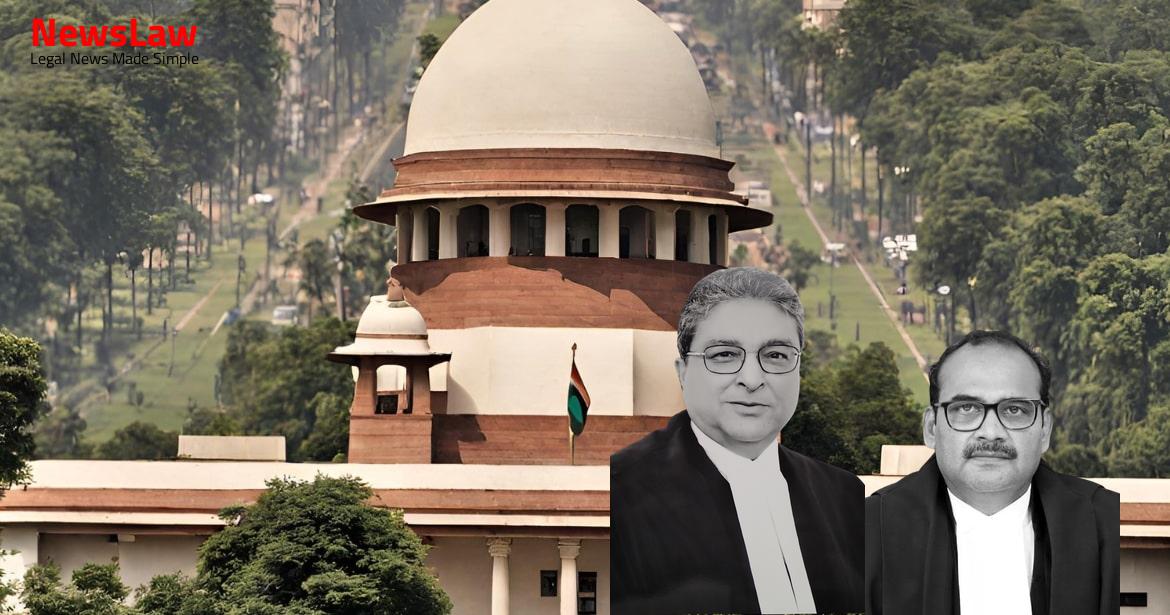Delve into the court’s meticulous legal analysis surrounding the validity of mortgages in the context of an auction dispute. The court’s interpretation of relevant laws and its implications on property rights and financial responsibilities sheds light on the complexities of legal proceedings in such cases. Let’s unravel the intricacies of mortgage validity in auction disputes and the impact on all parties involved.
Facts
- The guarantor did not pursue the matter further after filing an appeal.
- The appeal challenges a judgment passed by the High Court regarding the issuance of a sale certificate in a case where the borrower defaulted on a loan, leading to it being declared a Non-Performing Asset (NPA).
- The petitioner bank claimed creation of an equitable mortgage over certain properties by the borrower, which was denied by the borrower in its written statement.
- Auction proceedings were initiated by the bank, and certain applications were made before the DRT regarding the return of original documents deposited with them.
- The DRT rejected an application for the return of documents based on the argument that the validity of the mortgage over the properties in question needed to be examined further.
- Various parties involved in the case either did not submit counter statements or advance arguments.
- The High Court reversed an order from the DRAT regarding the return of original documents deposited by the bank before the DRT.
- Legal disputes arose concerning the mortgage over properties between the bank, borrower, and guarantor, leading to litigation and auction of assets.
- The guarantor challenged possession notices issued by the bank under the Securitisation and Reconstruction of Financial Assets and Enforcement of Security Interest Act, 2002.
- The auction of properties resulted in a sale to a third party, with subsequent legal challenges from the guarantor.
- Legal proceedings involved recovery of outstanding dues amounting to Rs. 25,49,19,820.41 from the defendants.
- The auction purchaser was not directly involved in the original application or subsequent writ petition filed by the guarantor.
- The guarantor’s appeal against a decision related to the auction was dismissed for non-payment of pre-deposit amount.
- The DRAT allowed an application by the bank resulting in the return of original documents deposited by the bank.
- The High Court restored the order passed by the DRT
- The order rejected the application preferred by the Bank
- The decision was made after considering the factual matrix
Also Read: Land Acquisition Challenges for Integrated Infrastructure Project
Arguments
- The petitioner challenged the validity of the mortgage in question before the DRT, but this contention was negatived in a previous order.
- The DRT noted that there was no violation of the SARFAESI Act in issuing the possession notice, confirming the validity of the security interest created over the properties.
- The guarantor argued about the differences in Acts and contended that Section 13(4) of the SARFAESI Act is only an enabling provision until final liability adjudication.
- In cases where the existence or validity of the mortgage is disputed, a different approach is required as compared to cases where the mortgage’s existence is admitted.
- The DRT can only address procedural irregularities by the bank and cannot determine the disputed questions of existence or validity of the mortgage, unlike in proceedings under the Recovery of Debts and Bankruptcy Act, 1993.
- The concept of caveat emptor applies in public auctions, necessitating the purchaser to verify and ensure the title of the property before purchase.
- The appellant, as the auction purchaser, has obtained the sale certificate from the Bank and is entitled to original title documents of the purchased properties.
- The guarantor has filed various petitions challenging the auction and possession notices, all of which were rejected.
- The appellant argues that the guarantor admitted to the mortgage in question and even offered to settle outstanding dues, hence the High Court should not have entertained the guarantor’s writ petition.
- Multiple legal bodies have upheld the validity of the mortgage created in favor of the Bank, despite the guarantor’s objections.
- The jurisdiction of the Debt Recovery Tribunal (DRT) is limited to supervising Bank actions under Section 13 of the 2002 Act and cannot decide substantial issues like the validity of the mortgage.
- The Tribunal finds that the petitioner is prolonging litigation and defying lawful demands of the Bank, exploiting its own delays.
- The title documents related to a specific land mentioned in a court decree in favor of another party should not be released to the appellant based solely on the sale certificate, until the final decision in the relevant case.
Also Read: Interpretation of Provisions in the 1946 Act: Jurisdiction of the CBI
Analysis
- The original application is crucial for deciding the validity of the mortgage and the entitlement of the bank for recovery.
- The auction sale has concluded, and a sale certificate has been issued in favor of the appellant.
- The respondent bank has the right to initiate action under the SARFAESI Act.
- The guarantor cannot be permitted to resile from the admission of liability.
- The High Court directed remand of the application to the DRT for fresh adjudication.
- The DRT opined that the Bank had validly initiated measures under the SARFAESI Act.
- The guarantor raised the same plea in various proceedings, admitting the mortgage but alleging fraud.
- The Tribunal observed that the Original Application has reached the inquiry stage for deciding the mortgage validity.
- The issue of ownership disputes should not hinder the bank’s right to recovery.
- The guarantor continued challenging the possession notice and validity of the mortgage in different proceedings unsuccessfully.
- Modification of the DRAT’s operative order was deemed appropriate based on the unique facts of the case.
- The application by the Bank for return of original documents was partly allowed, with exceptions for specific land subject to a decree.
- Parties are permitted to present all contentions before the DRT in the ongoing case O.A. No 11/2008.
- The High Court’s decision to entertain the writ petition by the guarantor was deemed erroneous and reversed.
Also Read: Legal Analysis of Compulsory Retirement under Rule 135
Decision
- DRT will return the documents to the bank for further proceedings
- Presiding Officer will adjudicate the OA after hearing both parties according to law
- Impugned order is set aside
- Pending interlocutory applications, if any, shall also stand disposed of
- The presiding officer will decide the issue on merits after hearing parties according to law
- Presiding officer should not be influenced by the order
- DRT is free to pass appropriate directions regarding the documents mentioned in the order
- Appeal partly allowed with no order as to costs
Case Title: M/S TRIPOWER ENTERPRISES (PRIVATE) LIMITED Vs. STATE BANK OF INDIA (2020 INSC 360)
Case Number: C.A. No.-002373-002373 / 2020



